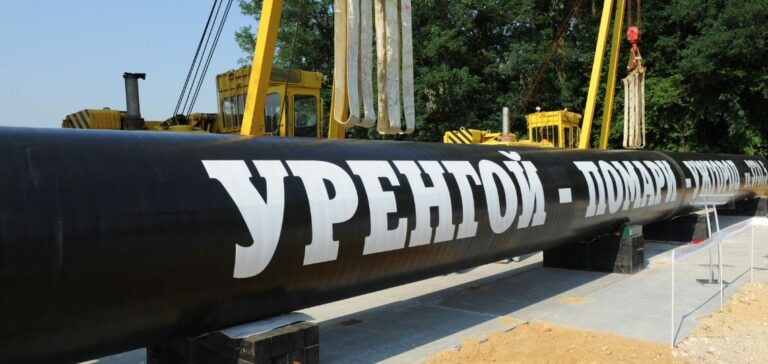The gas transit agreement between Russia and Ukraine, signed in 2019, comes to an end in 2024.
This agreement has enabled Russia to transport up to 40 billion cubic meters (bcm) of gas a year through Ukrainian territory, supplying a large part of Europe. This infrastructure is crucial for countries such as Austria, Slovakia and Hungary, which remain partially dependent on Russian gas supplies.The gradual reduction in European dependence on Russian gas since 2022, in response to the invasion of Ukraine, has not completely eliminated the need for transit via Ukraine.
In 2023, 14.65 bcm of gas still passed through this strategic corridor.
Kiev, firmly opposed to extending the agreement, has already indicated that there will be no renewal, casting serious doubt on the continuity of gas flows beyond 2024.
The alternatives available to compensate for a possible cessation of transit via Ukraine are limited.
The TurkStream pipeline, linking Russia to Southern Europe via the Black Sea, does not have the capacity to fully replace current volumes.
Moreover, although the European Union has stepped up its efforts to diversify its sources of supply, notably with Azerbaijan via the Southern European Gas Corridor, these initiatives cannot quickly compensate for the possible loss of Ukrainian transit.
The financial impact for Gazprom would be significant if flows via Ukraine were to cease, with an estimated loss of revenue of $4.5 billion a year.
However, the stakes go far beyond economic considerations.
The end of the agreement could accentuate tensions between Russia, Ukraine and the countries of the European Union, increasing the risk of further disruption to energy markets.
European governments and industrial players alike must now anticipate these scenarios by strengthening their infrastructures and continuing to diversify energy sources.
These measures are essential to limit the risk of supply disruptions and to guarantee the continent’s long-term energy stability.
Europe faces the uncertainty of Russian gas transit via Ukraine
The imminent expiry of the gas transit agreement between Russia and Ukraine in 2024 could lead to major disruptions in energy supplies to several European countries, exacerbating current geopolitical tensions.
Share:

Comprehensive energy news coverage, updated nonstop
Annual subscription
8.25$/month*
*billed annually at 99$/year for the first year then 149,00$/year
Unlimited access • Archives included • Professional invoice
OTHER ACCESS OPTIONS
Monthly subscription
Unlimited access • Archives included
5.2$/month*
then 14.90$ per month thereafter
FREE ACCOUNT
3 articles offered per month
FREE
*Prices are excluding VAT, which may vary depending on your location or professional status
Since 2021: 35,000 articles • 150+ analyses per week
- Popular on energynews.pro
After two seizures in ten days, U.S. authorities are pursuing another tanker suspected of evading sanctions. Maritime tracking data and official statements point to intensified controls on crude cargoes linked to Venezuela.
China reduces its mining presence in Canada and Greenland, constrained by hostile regulatory frameworks, and consolidates public investments in Arctic Russia to secure strategic supplies.
The Turkish president suggested to Vladimir Putin a limited ceasefire targeting Ukrainian ports and energy facilities to reduce risks to strategic assets and pave the way for negotiations.
New Delhi and Moscow strengthen their energy corridor despite US tariff and regulatory pressure, maintaining oil flows supported by alternative logistical and financial mechanisms.
The United States strengthens its energy presence in the Eastern Mediterranean by consolidating a gas corridor through Greece to Central Europe, to the detriment of Russian flows and Chinese logistical influence over the Port of Piraeus.
Paris and Beijing agree to create a bilateral climate task force focused on nuclear technologies, renewable energy and maritime sectors, amid escalating trade tensions between China and the European Union.
Ankara plans to invest in US gas production to secure LNG supply and become a key supplier to Southern Europe, according to the Turkish Energy Minister.
Three Russian tankers targeted off the Turkish coast have reignited Ankara’s concerns about oil and gas supply security in the Black Sea and the vulnerability of its subsea infrastructure.
Bucharest authorises an exceptional takeover of Lukoil’s local assets to avoid a supply shock while complying with international sanctions. Three buyers are already in advanced talks.
European governments want to add review and safeguard mechanisms to the trade deal with Washington to prevent a potential surge of US imports from disrupting their industrial base.
The Khor Mor gas field, operated by Pearl Petroleum, was hit by an armed drone, halting production and causing power outages affecting 80% of Kurdistan’s electricity capacity.
Global South Utilities is investing $1 billion in new solar, wind and storage projects to strengthen Yemen's energy capacity and expand its regional influence.
British International Investment and FirstRand partner to finance the decarbonisation of African companies through a facility focused on supporting high-emission sectors.
Budapest moves to secure Serbian oil supply, threatened by Croatia’s suspension of crude flows following US sanctions on the Russian-controlled NIS refinery.
Moscow says it wants to increase oil and liquefied natural gas exports to Beijing, while consolidating bilateral cooperation amid US sanctions targeting Russian producers.
The European Investment Bank is mobilising €2bn in financing backed by the European Commission for energy projects in Africa, with a strategic objective rooted in the European Union’s energy diplomacy.
Russia faces a structural decline in energy revenues as strengthened sanctions against Rosneft and Lukoil disrupt trade flows and deepen the federal budget deficit.
Washington imposes new sanctions targeting vessels, shipowners and intermediaries in Asia, increasing the regulatory risk of Iranian oil trade and redefining maritime compliance in the region.
OFAC’s licence for Paks II circumvents sanctions on Rosatom in exchange for US technological involvement, reshaping the balance of interests between Moscow, Budapest and Washington.
Finland, Estonia, Hungary and Czechia are multiplying bilateral initiatives in Africa to capture strategic energy and mining projects under the European Global Gateway programme.





















